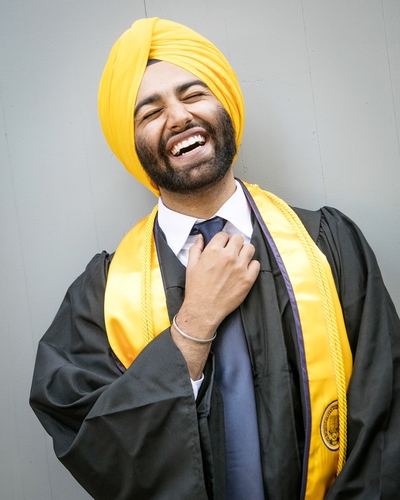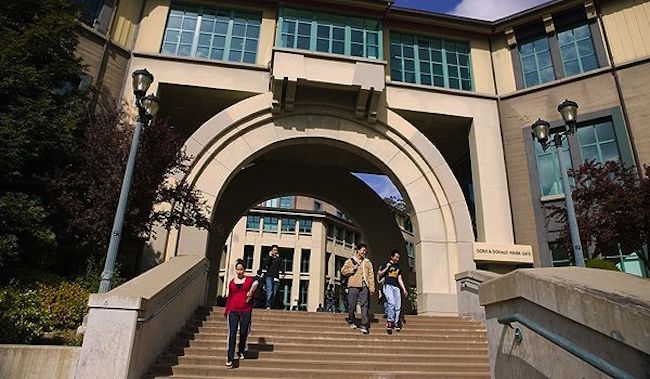For Angad Singh Padda, there’s a difference between doing good business and engaging in the business of doing good. Padda, now an investment banker at JPMorgan, spoke about this difference in his undergraduate commencement speech at UC-Berkeley’s Haas School of Business in May. It’s a speech that has since gone viral.
In “A Sikh’s Speech to Unite the World,” Padda encouraged his fellow graduates to not simply utilize their degrees for profit, but to create a unified world without prejudice.
“Whenever there’s a kid in Oakland who can’t afford school, that’s a problem,” Padda said in his speech. “Whenever climate change wipes out a species, that’s a problem. Whenever a Muslim woman gets bullied because of her hijab, or a Jewish man because of his yarmulke, or a Sikh man because of his turban, that is a problem.”
A GRADUATION SPEECH SHARED 1.8 MILLION TIMES
Padda’s speech has racked up almost a quarter-million views on YouTube and 1.8 million shares via Upworthy.
Padda doesn’t see one greatest problem in the world — it’s understanding that every problem matters and that people all need to unite to solve the world’s problems.
“The whole point of my education process and coming to the U.S. was to understand that, as a human being, you’re not just committed to solving one problem,” Padda tells Poets&Quants. “Wherever you are and whoever you’re surrounded by, you learn so much and there are so many causes to be actively engaged in.”
LOVE FOR DIVERSITY LEADS TO AMERICA
Padda grew up in Punjab, India—a state he describes as a “beautiful place founded in social service and affection.” Originally, he had planned to pursue a medical education at one of the top medical schools in India. At the last minute, Padda had a realization where he asked himself what he really wanted.
“I wanted something that would expose me to global diversity,” Padda says. “I wanted a chance to experience education abroad in a foreign country. I thought that business was the right fit for my passion for people, love for culture, and diversity. At the end of the day, much more than the finance, accounting, and supply chain development, business is really about people.”
Padda chose the Bay Area for its diverse and accepting culture. The undergraduate business education at Haas seemed like the perfect fit for his aspirations of connecting with people. Yet initially, Padda—who is of Sikh heritage—says he was anxious about coming to the state for the first time.
“When I first arrived, I was scared,” he says. “I have a unique appearance. I have a very thick accent. I was afraid of whether or not I’d be accepted.”
MAKING FRIENDS ACROSS THE WORLD IN THE BAY AREA
Padda quickly found that he wouldn’t be judged over his appearance in the Bay Area. He recalls moments on BART, the Bay Area Rapid Transit, where people would even compliment his colorful turban—he has over 56 different colored turbans.
For Padda, the transition into the Bay Area was “seamless” and he says he was lucky to form friendships that weren’t based on the color of his skin. He recalls making friends from “almost every country in the world.” He says the spirit of UC Berkeley was the motivation behind his speech.
“When I first came here from India, it was unbelievable for me to see people who are so driven to not only be academically successful, but also to make a difference,” Padda says.
MISSION TO REDUCE DRUG ABUSE IN NATIVE PUNJAB
Padda’s own drive comes from a darker past. When Padda was in high school, he lost two of his close friends to drugs. In Punjab, he says there is a growing drug epidemic. A recent government study, reported by the BBC, suggests that more than 860,000 young men in Punjab, between the ages of 15-35, take some form of drugs. For Padda, the statistic is a reminder that he has a greater responsibility.
“To this day, when I think about it, it just further makes me realize that I want to engage in endeavors where I can prevent other families from losing innocent lives at the hands of drugs,” Padda says.
The root cause of the drug epidemic in Punjab, Padda says, is a lack of proper education. His long-term goal is to build schools where he can educate the underprivileged children in the community. “That can only happen if I gain a better understanding of how the world works and how business works,” he says. “I want to become proficient in the trade and successful enough where I could go to India and open schools.”
It’s a long process, Padda says, and right now it’s about taking “baby steps.” He currently donates a percentage of his salary toward these endeavors and the “people already doing good work.”













